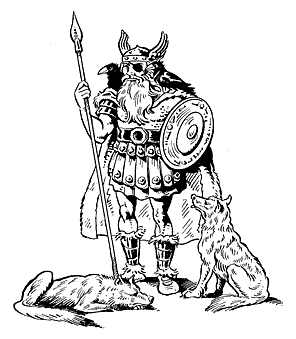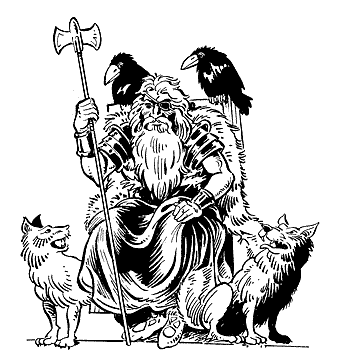Calendar, Anglo-Saxon Wodensdaeg
(Wodensdaeg, an Anglo-Saxon name for Wednesday)
From the Anglo-Saxon’s Wodensdaeg (Woden’s day), we get Wednesday. In Teutonic mythology, Odin, Woden, Woutan, and Votan [plus hundreds of other names], was the one-eyed patriarch and chief of the gods; god of wisdom and war.
- Woden was the principal god of the Teutonic people and has been regarded as such for centuries, especially among the ancestors of the Germans.
- In the fifth century, when the Angles and the Saxons invaded England they called upon Woden for his guidance and protection before starting out.
- More recent research seems to show that Woden was a continuation of an Indo-European god from long ago.
- There was a wide-spread belief in Germanic lands that on certain stormy nights the tumultuous gallop of a mysterious troop of riders could be heard in the sky.
- These riders were believed to be the phantoms of dead warriors.
- Among the ancestors of the Germans it became Woden or Wotan, among the ancestors of the Scandinavians it was Odin.
- In Scandinavian countries, Woden was called Odin, the god of war and of intelligence.
- It was Odin who ordained the laws which ruled human society and it was at his command that dead warriors were burned with everything that belonged to them on funeral pyres.
- By taking all of his worldly possessions with him, the dead warrior would find them again when he reached Valhalla.
- He carried his spear, Gungnir, as a scepter or staff.
- Odin’s horse, Sleipnir, was the best and swiftest of all stallions and had eight hooves.
- Although Odin was called “All-father”, he wasn’t regarded as a creator. Like his Greek counterpart Zeus, he was limited in power and they were both helpless in the hands of the Fates who were Norns in Scandinavia and Moirai (Moerae) in Greece.
- Like Zeus, Odin was the sky-father.
- Even when Odin sat at the feasts of the gods in Gladsheim, his golden palace, or with the heroes in Valhalla, he ate nothing.
- Whenever any food was put in front of him, he gave it to his two wolves, or “watchdogs”, Geri and Freki, who were by his feet.
- Although he was the "All-father", supreme among gods and men, still he continually desired and sought for more wisdom.
- He went down to the Well of Wisdom that was guarded by Mimir ("he who thinks"), to beg for a drink from it.
- In Mimir’s fountain was hidden all wisdom and knowledge.
- Mimir said Odin could drink from the well if he paid for it with one of his eyes.
- As he sat on his throne, called Hlidskialf in the palace Valhalla, he looked out over all the world and watched the doings of the gods, giants, dwarfs, and all of the other humans.
- On his shoulders perched his two ravens, Hugin (Thought) and Munin (Memory), who whispered in his ears about the events they saw in their daily flights over the earth.
- While Odin is known throughout western Europe and Scandinavia, his importance and attributes vary greatly with locality and time.
- His worshippers are thought to have originated in Lower Germany and spread from there.
- In addition to being the creator, father of the gods, inventor of the arts, god of wisdom and war; he was also considered a powerful magician, sorcerer, and healer.
- Some sought his aid in trade and sailors called on him for a fair wind and he was the patron of travelers.
- In northern countries, the constellation Great Bear is often called Odin's Wain and Wednesday is a contracted form of Woden's Tag.
- Odin is known by over two hundred names, many of which refer to a particular identity he assumed for one of his many adventures either alone or in company with his fellow gods.


Time has no divisions to mark its passing. There is never a thunderstorm to announce the beginning of a new month or year.
